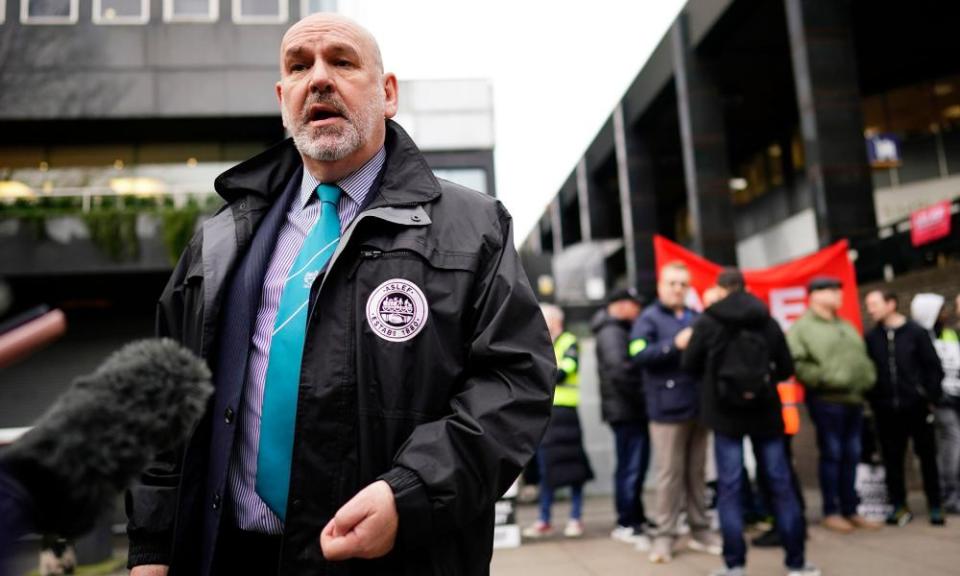Train drivers to strike on 1 and 3 February after pay deal rejected

Train drivers represented by the Aslef and RMT unions are to stage fresh strikes on 1 and 3 February in the long-running dispute over jobs, pay and conditions.
The strikes are expected to halt most train services across 14 train operating companies, including intercity and commuter routes.
The first strike will coincide with industrial action by 100,000 civil servants in their dispute over pay and jobs, a strike by teachers over pay and nationwide protests against the government’s new strike law.
Aslef has rejected a pay offer worth 8% over two years. Mick Whelan, the Aslef general secretary, said the proposal “came with so many conditions attached that it was clearly unacceptable. But we are willing to engage in further discussions with the train operating companies.”
Aslef’s eight-strong executive committee had met since Monday afternoon to consider the proposals from the Rail Delivery Group (RDG), which represents train operators.
Whelan, who had been angered by the offer’s release to the media before he had seen it, had already said there was “zero chance” of his members accepting a deal that was below inflation and worsened their terms.
He said: “It’s now clear to our members and to the public that this was never about reform or modernisation but an attempt to get hundreds of millions of pounds of productivity for a 20% pay cut while taking away any hope of the union having any say in the future.
“Our members at these companies have not had an increase since 2019, despite soaring inflation, and it is time the companies – encouraged, perhaps, by the government – sat down with us and got serious.”
The RMT general secretary, Mick Lynch, said: “Our negotiations will continue with the rail operators to create a package on jobs, conditions and pay that can be offered to our members.”
The companies affected are Avanti West Coast, Chiltern Railways, CrossCountry, East Midlands Railway, Great Western Railway, Greater Anglia, GTR Great Northern Thameslink, London North Eastern Railway, Northern Trains, Southeastern, Southern/Gatwick Express, South Western Railway (depot drivers only), SWR Island Line, TransPennine Express and West Midlands Trains.
If the industrial action goes ahead, the two days will be the seventh and eighth national strikes by Aslef in the past year.
About 95% of train drivers are in Aslef, with a few hundred represented by the RMT. Train drivers aside, RMT members are not yet striking next month, after 15 days of strikes by its 40,000 members working for Network Rail and for train operators in other roles.
Talks will continue this week between the rail industry and the RMT, amid relative optimism that a deal can be reached in their dispute.
Negotiations were due to resume between Network Rail and the RDG and the RMT leadership on Tuesday, although the union said it was yet to receive any new proposals in writing.
Controversial clauses in an RDG pay offer rejected by the RMT in December – particularly concerning driver-only operation – are expected to be removed or substantially amended to allow progress in the talks.
The transport secretary, Mark Harper, said there was scope for a “better deal” after meeting union leaders last week, and he believed both sides were keen to reach agreement.
The dispute has cost the rail industry an estimated £400m in lost revenue, according to Network Rail.

 Yahoo Finance
Yahoo Finance 